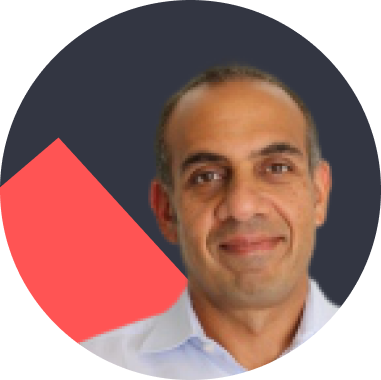Building Trust with
Dr. Amit Dayal

A Conversation with Dr. Amit Dayal
“One thing that we all have to be willing to say to our patients is, ‘Mr. Smith, I don’t know what the answer here is. I’m going to try to figure it out with you. And we’re going to work through this together.’”
Bio
Amit Dayal, MD, is an Associate Professor of Medicine and an Associate Program Director of Internal Medicine Residency Program at Loyola University. He joined the staff at Hines VA Medical Center and the faculty at Loyola in 2006. He has been actively involved in medical education and has developed several novel programs during his tenure. Dr. Dayal has served as Medical Clerkship Site Director since 2009 and was recently recognized as the M3 Attending of the Year. Dr. Dayal is a Canadian, Chicago White Sox/Bears fan, but most importantly a husband and the father of two girls.
Who were some role models in your early life?
“Both my mom and dad, as a child for two different reasons, were mentors for me,” Dr. Dayal began. “My father was an educator of some renown in medicine, an EMT, and he was one of those guys that you would term as a walk softly, but carry a big stick. He wouldn’t say a lot, but he’s very consistent about understanding a situation and then offering the solution. And I really admired that.”
From an early age, Dr. Dayal had the opportunity to watch his dad in action around the hospital and noticed that everyone looked up to him. On the opposite end of the spectrum, his mom was a go getter. She encouraged Amit to go skiing, skating, play hockey, and to do things that stretched his comfort zone. She was a great role model for him.
Then there was his cousin, Ash Razdan, who Dr. Dayal described as a “pretty nerdy engineer.” Because Ash was five years older than the young Amit, Dr. Dayal recalls looking up to him and learning the importance of excellence.
Why has the role of mentorship seemed to have weakened over the past 20-30 years?
“One of our chief residents, Lawrence Malo, became chief resident, and walked up to me and said, ‘You know, thank you for putting me in this position.’ And I said, ‘Larry, you got to here on your own.’ And he said, ‘No, it was some words that you gave while we were around and when I was an intern that inspired me to be chief resident.’”
This story underscores a belief Dr. Dayal holds dear, and it is that all people in mentorship positions should understand that even if they don’t have a direct mentorship role, they still have a tremendous impact on those who look up to them. It is for this reason Dr. Dayal has gone to great lengths to develop strong relationships with those he trains.
Despite having more information at our fingertips than ever before, there remains a need for personal mentorship. While a good physician should use the tools at their disposal, there is still an irreplaceable aspect of direct communication with a patient that must be had if proper care is to take place.
How do you teach students to care for their patients?
There is some advice Dr. Dayal always gives to residents that go into some specialty or into hospitalist medicine from a residency, and this is to know the nurses on their floor. “Know their first name, know something about them, and genuinely, be there as a colleague and participate in their life at work.”
“Successful health institutions are based on good, solid, interdisciplinary relationships,” Dr. Dayal continues. “So I always tell the residents they have to know their staff and they have to be part of the hospital. They can’t just be coming in, writing on the chart and leaving.”
“Watch your mentors, watch people that you consider to be successful doctors. How do they interact with a patient? How do they communicate with them? What words do they choose? What methods do they choose to allow them to assess whether the patient understands them or not? Credibly is important.”
Dr. Dayal has a common practice he does with students when he is the doctor. When he goes with them into a patient’s room, he allows them to play the role of a doctor. They do the talking. And if they run out of material to say, they can put their hand up. There is something transformational that happens through this process.
How do you develop trust with your patients?
“The one thing is you have to give your patients a chance to say what they want to say,” Dr. Dayal remarked. “We often walk in a room with an agenda like heart failure, carrier disease, staten, afterload reduction. That’s where I’m at, that’s what I want in the room, this is my agenda. But the patient may be more concerned about something else. So, first thing that I do is talk with the patient and listen to what they say.”
Every patient has different preferences and priorities. It is up to the physician to get to know their patients on their level.
Dr. Dayal always asks patients about themselves. For example, Dr. Dayal has a fair amount of interaction with military veterans at the VA. There, he is intentional about asking them about their service. Even though he was raised in Canada, Dr. Dayal has been intentiona to be a student of American history, thus allowing him to connect at a deeper level. This says to his patients that they are important.
“One thing that we all have to be willing to say to our patients is this, ‘Mr. Smith, I don’t know what the answer here is. I’m going to try to figure it out with you. And we’re going to work through this together.’”
Pearls of Wisdom
- Mentors see value in things that may not seem immediately visible to us. That is the difference between logic and wisdom.
- Don’t walk in with an agenda. Don’t talk at the patient, talk with the patient. Be willing to say “I don’t know”.
- The white coat we don is a privilege. The earlier we recognize its value and importance, the more sincere we will become with our profession.
